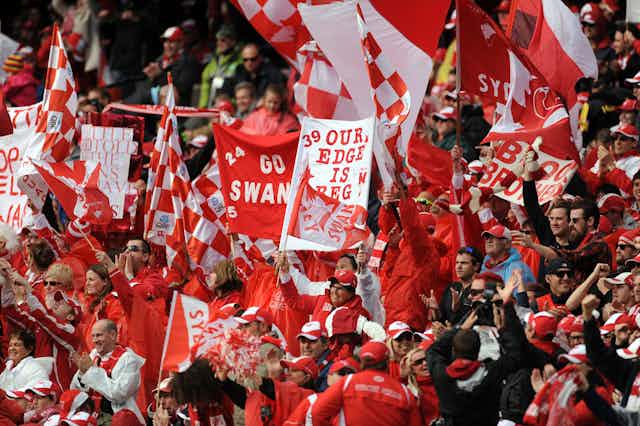Hawthorn has recovered after a rough patch this season, with key players shaking off injuries and its tenacious coach returning after a health scare. So why have the Hawks earned their spot on Saturday’s AFL Grand Final against the Sydney Swans despite their run of setbacks?
Quite simply, Hawthorn has developed a plan that prevents the team from slipping if something goes astray. All developing players act like understudies and have learned to step up when the cracks appear.
Emerging Hawks have earned their spots, including midfielder Will Langford and defender Taylor Duryea. The cyclic nature of football has meant players need to perform well at the elite level when a berth opens up. This has happened at Hawthorn.
Hawthorn coach Alastair Clarkson’s has shown foresight to condition most of his players to attack and convert goals, while practising under pressure. Inaccurate kicking cost Hawthorn the 2012 premiership against the Swans.
Despite Hawthorn’s methodical approach to help them win consistently, the team’s flaws may become exposed in the Grand Final. The question is: who is the weakest link?
Identifying weakness
There are some glaring weaknesses in the Hawks’ line-up and they’re all related to players recovering from leg injuries. Sam Mitchell looked slow when he was tackled and penalised last week, and although he is a workhorse, his recent hamstring injury may have impacted on his speed.

Hawks star forward Cyril Rioli has virtually no match fitness and is a wild card after returning from a serious hamstring tear.
If Swans forward Lance “Buddy” Franklin converts accurately and often, then Sydney will claim the flag. But if the Hawks’ key players – captain Luke Hodge, Brian Lake, Josh Gibson, Jarryd Roughead, Mitchell and Rioli – all play to capacity, then the match will be a nail biter.
Sydney’s line-up is packed with talent, boasting two of the AFL’s most talented forwards, Franklin and Kurt Tippett, who are match winners. The Swans’ fleet-footed midfielders - Dan Hannebery, ex-Hawk Josh Kennedy, Lewis Jetta, Luke Parker and Kieren Jack - will play a fast, attacking game out of the centre.
But the Hawks are excellent fighters and are better at winning tight matches, often relying on their improved goal kicking to win.

Full forward Roughead is a proud player and he will be pumped to take on the Swans’ defence. Roughead won’t want to see Franklin upstage him at the other end of the ground. Roughead is capable of swinging matches and the Hawks will be relying on his versatility to dominate the forward line.
Hodge was exceptional in the dying minutes against Port Adelaide in the Preliminary Final. In a Fox Sports footy poll published this week, fans voted Hodge as the AFL’s best big-time player.
Hodge’s steadiness in high-pressure games could prove the difference between the highly talented units.
The winning team
The team that wants it more often wins and so there needs to be a high workrate around the ball. The old saying, “the harder you work, the luckier you get”, has relevance when it’s down to the wire. Hodge leads by example, and under his on-field leadership, the players mostly remain focused on their team roles.
After Hawthorn’s 2012 Grand Final loss to the Swans, former Hawk champion Leigh Matthews said the Hawks lost the game because they lacked composure, their workrate was lower and they kicked too many points. Since then, Hawthorn has worked to correct these weaknesses.
Big-game Hawthorn forward Jordan Lewis is recovering from a corked thigh and his mobility was affected in last Saturday’s Preliminary Final against Port Adelaide.
I’m not convinced a player can recover from a corked thigh and perform optimally after a week. These injuries can take two-to-four weeks to heal, as there is internal bleeding. Lewis says he has recovered well, but I believe this injury may impact on his speed.
Kennedy has recently returned from a hamstring injury and he may not be at peak fitness when he fronts up in the middle.
Under pressure
If anyone will choke on Grand Final day, it’s often the players who haven’t been there before. Hawthorn’s Duryea and Matthew Spangher are among those untested in Grand Finals.

Tippett proved he handles pressure well after a brilliant match against North Melbourne last week, while Swans livewire Ben McGlynn will play in his first Grand Final after missing out in 2008 (Hawks) and 2012 (Swans).
The overwhelming sensation of playing in a Grand Final can often make players fumble and miss goals. That’s why some Grand Finals are ugly, scrappy affairs.
I’m tipping the Swans to win, based on three observations. Buddy’s ego is huge and he wants to win a premiership for the Swans. Mitchell may be outrun by the Swans’ class midfielders and Rioli, desperately lacking match fitness, might act as a passenger.
Further reading:
The AFL grand final – a carnival of struggle, passion and tragedy
Buddy Franklin has the swagger – but can he be an Aussie hero?

